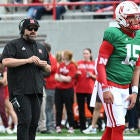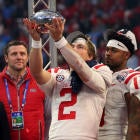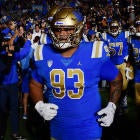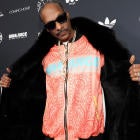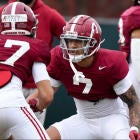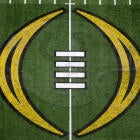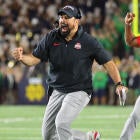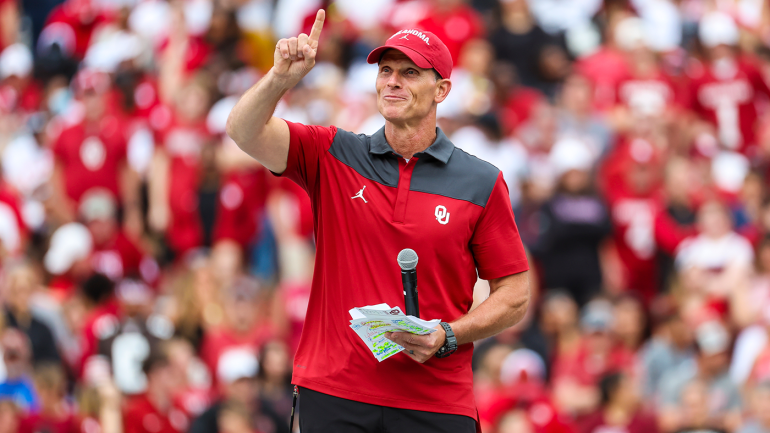
SCOTTSDALE, Ariz. -- Bob Stoops stopped by a table in the lobby of the Hyatt Regency Scottsdale Resort & Spa last week. It was doubling as a workspace. Media had posted up knowing full well that coaches and administrators had to pass by on their way to check in for conference spring meetings.
In quiet moment, Stoops was asked the Big Why at Oklahoma. Why, after Lincoln Riley's abrupt departure, was this the job for Brent Venables?
"You kiddin' me?" Stoops shot back. "It's Oklahoma."
Yes, but it also might have been Auburn, UCF, Kansas State, Florida State or any of the scores of other possible landing spots over the years for Venables, one of the game's best defensive minds. Heck, it might have eventually been Clemson if Alabama ever called Dabo Swinney home.
But it's actually a lot more than all that. It's a sense of loyalty developed at one of the low points of Venables' career that led to him returning to the Sooners.
Twenty-four years ago, on a raucous December afternoon in 1998, Kansas State fans were so sure they were going to the first BCS Championship Game that they lined up at pay phones in the Edward Jones Dome concourse as the Wildcats were trouncing Texas A&M in the Big 12 Championship Game. They were booking travel to Tempe.
The top-ranked Wildcats led by 15 with 9:20 left only to ultimately lose in double overtime. The then-27-year-old K-State linebackers coach watched his efforts fail as a national championship shot slipped through his fingers. When UCLA and Kansas State both lost that day, Florida State moved up to play Tennessee in that first BCS game. The Volunteers defeated the Seminoles for their sixth national championship and first in 31 years.
"I'm telling you right now, Tennessee, you would have had to take that one off the banner [because Kansas State would have won]," Venables told CBS Sports. "That was one of the top three [most] talented teams I've been on.
"I always tell myself that's the hardest loss I've ever been a part of. I've never been more heartbroken."
So heartbroken that coach Bill Snyder compared the hurt of that loss to how he felt upon the deaths of his mother and grandfather as well as automobile accident that paralyzed his daughter, Meredith.
The bitter memories came flowing back to Venables last week when the subject turned to the Big Why. It still bothers him that some fans blamed the crushing defeat on Venables and other Kansas State staffers. The claim was that the coaches were distracted that week as they had plans to move on after the season and join Stoops' new staff at Oklahoma.
"I said to myself at the time, 'I'll never put myself in a position where somebody can judge me where my loyalty is,'" Venables said.
Two years later, then-Missouri athletic director Mike Alden called during Oklahoma's lead-up to the Big 12 Championship Game. It was a game the Sooners would win on their way to their last national championship. Venables refused to interview for the Tigers job.
That's how this moment must be framed.
Venables spent a decade at Clemson, becoming the top defensive coordinator in the country. His loyalty was reflected back as more and more schools called about his availability. Clemson, he said, got to the point it had funded a $500,000 annuity for him.
"As a coordinator, that was unheard of," Venables said. "I never had to ask for a dime."
And so, you begin to understand Venables' reasoning in passing up multiple opportunities. The job math just never worked.
The man has coached in eight national championship games across his 25-year coaching career, winning three. That's a lot of bad timing, a lot of interviews to turn down. It's also a lot of loyalty.
"Sometimes, you want security more than you want something [else]," Venables said. "I didn't want to make decisions for money."
There is a special bond at Oklahoma, of course. Following his time at Kansas State, Venables spent 13 years as Oklahoma's defensive coordinator.
Unlike what Stoops faced in 1999, the Oklahoma that Venables is taking over does not need to be rebuilt. Riley left the program purring like a sports car after leading it to four Big 12 championships and three College Football Playoff appearances.
"You may not be taking over a Lamborghini," Venables said of Oklahoma, "but it's definitely a 'Vette."
That's another explanation for the Big Why. Oklahoma is home for a kid who grew up in Salina, Kansas, and went to Garden City Community College before becoming part of Snyder's first winning team at K-State. Stoops, on the Wildcats' staff at the time, recruited Venables out of high school.
At Kansas State, Venables took out loans just to live. As a walk-on, there was Pell Grant money but no help from home. He essentially bet on himself by taking out what he estimates to be six-figures worth of loans that he hoped could be reconciled when he "made it."
It took Venables 15 years to pay them off. He was 38.
"I remember that really well; he did not have a vehicle," said former teammate Kirby Hocutt, now the Texas Tech AD. "He was bumming rides every day -- to work out, to practice. To the point of, 'Can I borrow your car to run here and do this?'
"I'm still calculating the gas money."
It's fair to say Venables' name was at the top of the break-glass-in-case-of-emergency list Oklahoma AD Joe Castiglione kept in the back of his mind.
Venables, now 51, ended a great career mystery in December when he chose Oklahoma -- more than the other way around -- and finally became a first-time head coach. After all those opportunities, all the considerations, all the turned-down interviews, the search to replace Riley took just a week.
"I started remembering [seeing] Bob's name connected to several jobs previously that he did not take for whatever reason, but he stayed at Florida," said Castiglione, recalling Stoops' time as the Gators defensive coordinator under Steve Spurrier.
It was Castiglione who ultimately hired Stoops away from Florida in 1998, beating out Stoops' alma mater of Iowa in the process.
"I remembered, maybe it was coincidental, but Brent being selective aligns more with how sure he is about what he wants," Castiglione added.
When the shocking news came down in late November that Riley was leaving for USC, Venables was out for a run.
"I laughed at it," Venables said. "I'm like, 'Yeah, right. No way.' I said, 'That's not a smart move.' That's what I said at the time.
"I've never lobbied for a job. If it's meant to be, it will jump right in my lap."
By that time, Venables had long been at or near the top of the list as one the nation's highest-paid assistants. When he went recruiting, he didn't so much go head-to-head with other ACC programs, he competed against the top SEC programs for the best defensive talent in the Southeast -- and the country.
When it was suggested Clemson operates like the 15th SEC program, Venables confirmed as much: "That's what it looks like."
He had also built up a sense of self and accomplishment. Even a man with no visible ego knew, if he was going to leave Clemson, he wanted to be properly courted. Venables had been Swinney's right-hand man, his defensive mastermind, his Yoda.
"'You're worth, at the minimum, $7 million. At the minimum,'" Venables recalls Swinney telling him, while pumping his fists for emphasis, after learning of Oklahoma's interest. "'I wouldn't do it for nothing less. That's what you're worth. That's what you deserve.'"
Since 2000, Venables has coached eight national award winners, 16 consensus All-Americans and 57 NFL Draft picks, including 12 first-rounders.
"I don't want a job if somebody is like, 'Ah, are you interested?'" he said. "You want it like a Double A gap safety blitz coming after you."
Swinney is surely pleased. Venables' six-year contract averages $7 million per season.
But the partnership had to be perfect, as in aligned, winning, supportive, historic. Money was about 32nd on the list, if it appeared at all.
When asked whether he has a blueprint -- physical or otherwise -- about the eventual transition to the SEC, Venables pulled a thick binder out of his carrying bag.
That's another reason Venables was a fit. He knows how to win in the SEC (16-7 vs. the conference at Clemson). Given the depth of the SEC, it's doubtful OU is going to win six straight conference titles like it did in the Big 12 (2015-20).
"This is, 'Good to Great,'" Venables said, holding up the binder. "Everything matters. That's things I've put together the last 4 ½ months. This is what it's going to take. It's a 10,000-mile view, and OK, I'm in the bunker, too."
Oklahoma's soul has a wound that needs to heal. When Riley left after five seasons, the decision suggested that OU was perhaps a steppingstone job. Riley had the Sooners absolutely wired. His success is a big reason Oklahoma joined Texas in going to the SEC at some future date. (That's another discussion for another time about the Big 12 itself feeling like a steppingstone.)
"It's not crazy," said Venables, defending Riley. "USC is a great program, had a lot of success. The timing might be right. They've been down. A few tweaks and a couple of good recruits, bam.
"You know Lincoln, he definitely wasn't using [Oklahoma as a steppingstone]."
For all the celebration of his return, Venables still is a first-time coach -- the fourth consecutive assistant to be elevated to one of the most powerful positions in college sports at Oklahoma. In fact, since 1946, Howard Schnellenberger is the only person to have taken the job with head coaching experience. (And he lasted just one season before resigning after the Sooners went 5-5-1 in 1995, achieving just their second losing record in conference play since World War II.)
At first glance, the coaching transition from Riley to Venables should be somewhat seamless.
Oklahoma will be favored to win the Big 12 this year while running the familiar Air Raid offense under new coordinator Jeff Lebby. it will be better defensively because, well, it must be. If Venables can't assemble a world-class defense -- with the help of a pair of co-coordinators -- then what was this endeavor about?
"I felt prepared for a long time. Very prepared," Venables said. "… Oklahoma has shown support. They've shown a history of success. They've won 78 games the last seven years.
"It's not a rebuild."














